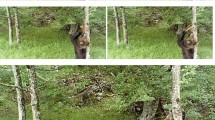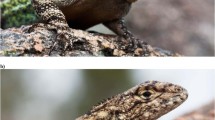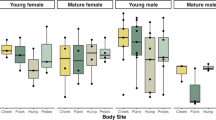Abstract
WHITE coloration of many animals in cold environments decreases the possibility of visual detection because of the lack of contrast between the animal and its white background. White hair thus provides concealing coloration for prey species such as arctic hare (Lepus arcticus), and for predators such as the polar bear (Ursus maritimus) and arctic fox (Alopex lagopus).
This is a preview of subscription content, access via your institution
Access options
Subscribe to this journal
Receive 51 print issues and online access
$199.00 per year
only $3.90 per issue
Buy this article
- Purchase on Springer Link
- Instant access to full article PDF
Prices may be subject to local taxes which are calculated during checkout
Similar content being viewed by others
References
Brooks, J. W., in Bears—their biology and management (edit. by Herrero, S.), 138–141 (IUCN, Morges, Switzerland, 1972).
Lavigne, D. M., and Øritsland, N. A., Can. J. Zool. (in the press).
Kovarik, M., Nature, 201, 1085 (1964).
Øritsland, N. A., Comp. Biochem. Physiol., 40 A, 359 (1971).
Øritsland, N. A., and Ronald, K., Comp. Biochem. Physiol., 44 A, 519 (1973).
Hamilton, W. J. III, Life's color code, 49–67 (McGraw-Hill, New York, 1973).
Author information
Authors and Affiliations
Rights and permissions
About this article
Cite this article
LAVIGNE, D., ØRITSLAND, N. Black polar bears. Nature 251, 218–219 (1974). https://doi.org/10.1038/251218b0
Received:
Issue Date:
DOI: https://doi.org/10.1038/251218b0
This article is cited by
-
Visible and ultraviolet reflectance characteristics of arctic homeotherms
International Journal of Biometeorology (1981)
-
Ultraviolet viewing with battery-operated television camera
Nature (1975)
Comments
By submitting a comment you agree to abide by our Terms and Community Guidelines. If you find something abusive or that does not comply with our terms or guidelines please flag it as inappropriate.



